Not impressed. Deeply dissatisfied. But not surprised at this confrontation with the passive-aggressive; the yearning to be like him, then the abject tragedy arising when the initiative is undertaken. Harold Bloom was just the man to review Robert Crumb’s The Book of Genesis. Was it a story of the very first woman meeting the very last man? Perhaps that’s the way the tablets crumbled after all. Effectively, Crumb’s Genesis posits early individualism within the context of rage, violence, and anger at Yahweh’s lack of pride in his craftsmanship or was it artistry.
Yahweh’s emotional trajectory may have been the first instance of corrupted classicism, a precursor of the romantic age, the unleashing of the unreasonable and the mad into the realm of global animated sculpture. But, it was too late to go back to the drawing board despite the temptation to dabble in nihilism in its positive and negative aspects. So Crumb really captures the rough and tumble of frontier justice, the boundary pushing, the give and take, the haggling over how many decent souls are needed to save Sodom; the bawdy and bad as the individual gropes towards some fixation on redemption as a kind of Marcel Duchamp ready-made. Kind of a cheap afterthought to pacify the parents.
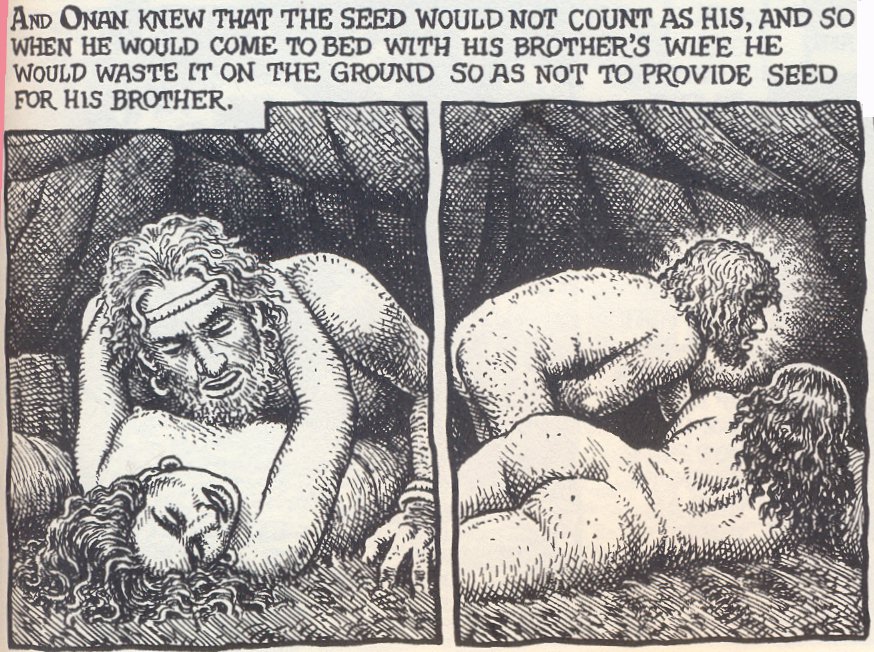
Read More:http://www.tcj.com/tcj-301-excerpt-from-the-genesis-interview/ ---Crumb: I’m not an agnostic, I’m a Gnostic. But that’s only a loose definition. I’m sure there’re official Gnostics out there who’d say, “You’re not a real Gnostic! You’re just throwing that word around!” And that’s true, I am. I’m sure there’s some very specific definition of a Gnostic, but my rough, crude definition of a Gnostic is someone who’s interested in the idea of higher spiritual existence or being or reality — a greater reality that you could call divine, you could call it God, you can call it the great spirit, all-that-is, whatever you want. But I’m interested in that, and I spend time studying that and seeking that, and seeking communication with it, a connection with it: the higher reality. So I call that Gnosticism. Groth: Gnosticism indicates that you do believe in a god or gods. Crumb: A god? Groth: A god or gods, yeah. Crumb: Well, look at it this way. Would you agree that we live in a reality that’s a unified field?
Where Bloom gets frosty is the normative undertone that Crumb takes. All that moxie and guile, a few flashes of elan only to conform to convention. It does underscore Bloom as the eternal sufferer, a cast out prodigal son mourning for a lost power. But he wears it well in all the earnestness and subtle comedy which mitigates the risk of the tragic. No, Bloom has no illusions about messianism in the Walter benjamin sense of violent revolutionary acts ushering in a messianic age through bursts of now time. No, this is long drawn out, protracted battle of attrition with yahweh that shatters the myth of the unity of disparities. Forget the straight gate of the messianic instance, this is a very cold war indeed where the outer edge of paradise spins so quickly that it appears to stand still.Bloom and Crumb share the gnostic disposition, albeit the artistic representation remains widely disparate…
None of this is to say that Bloom likes Yahweh, who he feels should be “convicted for desertion.” But present or absent, Yahweh is for Bloom inescapable, like death.Bloom calls himself a cultural Jew who does not “trust” in the covenant, trust being for him the hallmark of the normative Jew. crying out to a silent God who nevertheless “won’t go away.” What could be more normative than that?Yahweh, named like a pagan deity, has a full complement of human emotions, including reprehensible ones.
How uninteresting it is to be an atheist. I mean, you can’t make literature out of that….I think if you argue with God, or you’re angry at God, if you have a grudge against him, then that’s much more fun than just saying he’s not there at all….Well, the alternative is to entertain all of these fictions. Remembering what Uncle Wallace taught us, which is that the final belief he says is to believe in a fiction, with the nicer aspects of belief, that knowing that what you believe in is not true…
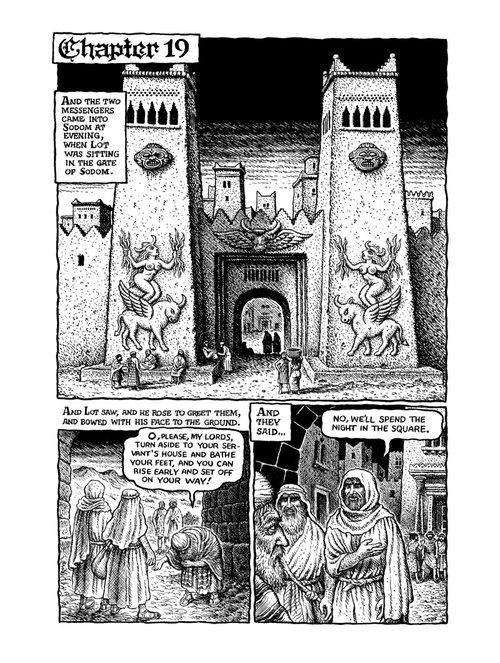
---Yahweh's apparent abandonment of his Covenant has long been a major problem for Judaism; the horrors of the twentieth century have pushed the issue to a limit point. Bloom points out that the Jews are to have trust in the Covenant, but understandably wonders how this can be possible anymore. He contrasts the types of spiritual comportment stressed by the three Western faiths: "Judaism emphasizes trust in the Covenant, Christianity professes faith that Jesus himself was the New Covenant, Islam is submission to the will of Allah." Trust, faith and submission are the three distinct grounds of our three Western monotheisms. I believe Bloom would acknowledge that trust, as a spiritual mode, has vulnerabilities that faith or submission do not. Or at least that the horrors of Jewish history have been such as to undermine precisely that virtue: trust. Yahweh promised Abraham descendants as numerous as the grains of sand on the seashore, and yet, as Bloom points out, Christians and Muslims now outnumber Jews more than a thousand to one. The Roman massacres of Jews and destruction of the Temple themselves dealt massive blows to Jewish trust. The Holocaust of the last century, Bloom insists, should be evidence enough: Yahweh has defaulted on his Covenant. But even the history contained in the Hebrew Bible, when Yahweh was presumably at his most engaged, does not offer a very encouraging picture. "We can be maddened by Yahweh's bewildering turns at revealing and concealing himself . . . his furies can seem so sudden and capricious. Yahweh commands a recalcitrant Moses to descend into Egypt, and then attempts to murder his prophet at a night encampment in the Negev, on the way down." (132; see Exodus 5:24ff) As with Moses himself, so with the whole people. Even in the Tanakh, the blessings offered prove few and far between.--- Read More:http://www.necessaryprose.com/namesdivine.htm
…. It’s just imaginatively much more interesting to be a Gnostic rather than an agnostic, to be fascinated by Yahweh rather than indifferent to him. Walt Whitman liked to say that the United States are in themselves the greatest poem. Alas they’re not, but it’s a nice idea. Yahweh is a great poem. [Pause.] I don’t think Jesus Christ is a great poem. [Pause.] I never quite make up my mind about Allah, though I’m fascinated by the fact that the Koran is the only book I’ve ever read in which every single phrase is spoken by God himself. It is the voice of Allah that you hear from the beginning to the end, supposedly by mediation of the angel Gabriel, being dictated to Mohammed, who however doesn’t write it down because supposedly he’s an illiterate, which baffles me, because he’s a successful merchant, and how could you have been a successful merchant if you were illiterate, and couldn’t read or write? But supposedly he memorizes it and then he dictates it—a very suspicious process of course, but then no more suspicious than the formation of Tanakh or the Greek New Testament.Read More:http://www.rc.umd.edu/praxis/bloom_hartman/bloom/bloom.html
…that God had breathing trouble and this trouble created the world. And I think I remark something like, “Try to hold in your breath for as long as possible, and then just before you can’t stand it any more, try to think something into creation, try to will or think something, and see what happens.” Which always makes me think of Kafka’s very grand remark to Max Brod, where he says, “We are one of God’s thoughts when he was having a bad day.” It seems to me he has mostly bad days. But since I don’t think there’s any distinction whatsoever between sacred and secular texts, there’s only great writing and bad writing (or good writing in between I suppose or fair writing) then it’s natural to speak of—in fact, remember what Blake says; he says religion is just choosing forms of worship from poetic tales, and then he adds—this is The Marriage of Heaven and Hell — “Thus men forgot that all Deities reside in the human breast.” But that doesn’t mean that they don’t reside there. And of course, this is now a very tricky business, because I’m not sure anybody—you’re not supposed to believe in Yahweh anyway if you are a normative Jew, you’re supposed to have Emunah, you are supposed to trust in the covenant with him, but he’s never kept the Covenant himself, and I get awfully weary of the Hebrew prophets who are always denouncing the people of Israel for violating their covenant with Yahweh when Yahweh hadn’t kept his for a moment, and always seems to be hard at work destroying his chosen people.Read More:http://www.rc.umd.edu/praxis/bloom_hartman/bloom/bloom.html
…Illustrating the Hebrew Bible has been a grand quest for painters, with Michelangelo and Tintoretto perhaps dividing the palm. A cartoon or comic book reduction of Genesis ideally should be the work of an unlikely fusion of Rembrandt and William Blake. That is not a fair criterion to invoke when considering R. Crumb’s venture into the Book of Genesis. Staring at the women and men of Crumb’s Genesis, I dimly recall someone showing me an issue of Mad magazine. To my untutored view the work of Crumb recalls that publication yet somehow also is touched with what I remember as the doughty proletarian style of Ben Shahn. At the least, Crumb’s cartoons have the initial merit of strangeness in their portrayal of the patriarchs and matriarchs of the first book of the Hebrew Bible…..
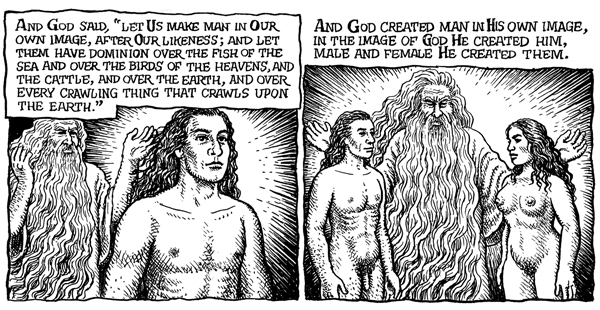
---No. I wouldn't have dreamed of trusting him in the first place. So what is there to be disappointed with? He is, he's bad news, he has always been bad news. No, I'm not disappointed; I find him very fascinating, very interesting. As I say, he's even more interesting than King Lear, and to some extent at least—well, Mark's Jesus and Hamlet run almost neck and neck in interest. Each of them has incredible mood swings, as Sir Frank points out, following me in that part of his review--- Read More:http://w
c.umd.edu/praxis/bloom_hartman/bloom/bloom.html image:http://bombsite.powweb.com/?p=5094…The people of Genesis are indeed picturesque but powerfully ugly in Crumb’s vision. I do not regret the men but the women from Eve to Rachel, are so dreadful that I am made unhappy. They hardly suffice even if you try to defend Crumb’s approach as one of healthy realism. What reply could suggest itself to me if a Crumb admirer asserted : “That is what they really looked like, back then”? There was no “back then”. Genesis, like Exodus and Numbers after it, is fabulous tale-telling, and not historical fact. You can call it myth if you want to or whatever you think best fits the tale of the tribe.Read More:http://loonpond.blogspot.com/2009/12/harold-bloom-r-crumb-and-yet-another.html
a
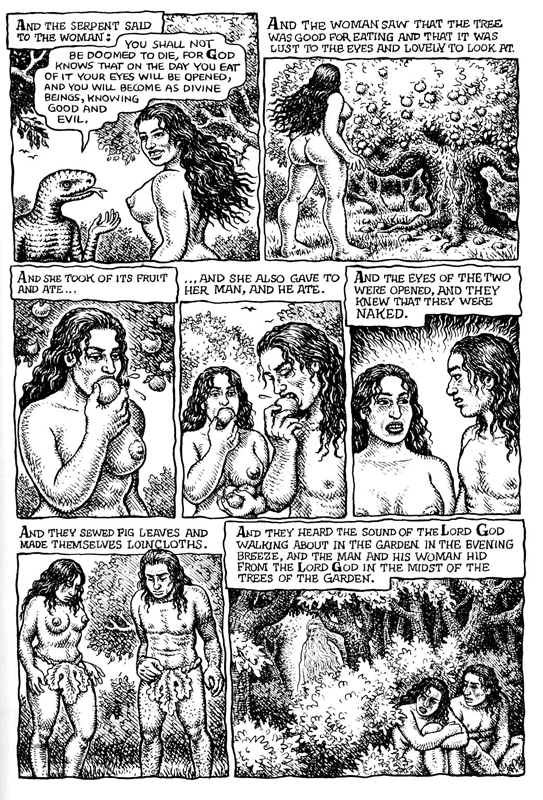
---Bloom:I drag it in at the end of the book because I got very bored by Sam Harris. You know pragmatically there's no difference between Sam Harris urging an end to faith; I would say fine, Judaism isn't faith anyway. That's Pauline Pistis, the substance of things hoped for, the evidence of things not seen. No, the only question is whether you trust Yahweh or you don't, and obviously you shouldn't and can't and couldn't and won't, because he's bad news, as I keep saying. He's as good an explanation for why everything goes wrong all the time as we could want. And he's had a terrible effect upon the world. Because in a somewhat altered and perhaps even more aggressive form, he is the Allah, which is a variant in Arabic on Elohim, of the Koran, of the Recitation, and he utterly disappears in Christianity, where God the father is just kind of an unfortunate, weak imitation of Yahweh. Read More:http://www.rc.umd.edu/praxis/bloom_hartman/bloom/bloom.html
ADDENDUM:
Bloom:In a perfectly, I think, Kabbalistic way that Yahweh may have come into existence by this act of Zimzum, this act of contraction or withdrawal, which means that he diminished himself in order to get started. Which I find fascinatingly parallel to Walt Whitman, in which I again follow Scholem: who used to say in conversations with me, that in a secular world somehow Whitman by some miracle without knowing anything about Kabbalah had in effect reinvented his own Kabbalah, and I think that is true. Whitman throughout Song of Myself and elsewhere is always saying that he is expanding, that he is getting to contain more and more multitudes, that his sense of self is steadily increasing. But in fact he too is always contracting and withdrawing. He is endlessly elusive and evasive, and the worlds that he creates and ruins also seem to come from some process of self-withdrawal….
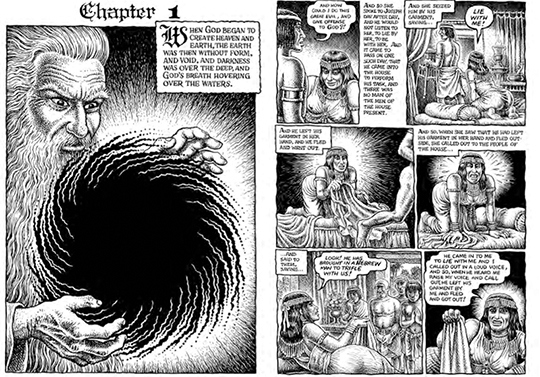
Bloom:Surely it comes back to Leibniz, doesn't it? Which is then picked up by the horrible Heidegger. Why should anything be, anyway, rather than not be? Since Yahweh puns on ehyeh, which is the ancient Hebrew verb for being. I don't know. In the end I suppose if I have to vote and go with any one, I go with Hamlet, who is a nihilist as I read him. I think Shakespeare's ultimately is nihilistic, not Christian, not even Hermetist, just nihilistic, but I don't know that pragmatically there's any difference between Yahwism and nihilism. You know: is this a difference that makes a difference? to invoke William James's, you know, quite Emersonian definition of American pragmatism. It doesn't seem to me that it is a difference that makes a difference. Read More:http://www.rc.umd.edu/praxis/bloom_hartman/bloom/bloom.html
…Well, there are Yahwehs—just as I say there are seven versions at least of Jesus or Jesus Christ, or Jesus and Jesus Christ, in the Greek New Testament, there are innumerable versions of God in Tanakh, the Hebrew Bible, but the one who interests me and always has and always will, is the original one, the first Straha, traditionally called J or the Yahwist, probably written as early as the reign of Solomon, 3,000 years ago, in which most certainly he is as I say a stern imp, up to a lot of mischief, something of a trickster God—human all too human: he’s always walking around on the ground; he isn’t flying up in the air—he’s walking around on the ground in order to make personal, you know, sort of on the job inspections of how things are going. He closes the door of the ark—of Noah’s ark with his own hands; he even more memorably buries Moses in an unmarked grave, with his own hands; he is very fond of picnics; thus at Mamre he sits beneath the terapim trees because he always likes to be in the shade rather than the sun, thus he walks we are told in Eden in the cool of the day, at Mamre, with two of the Elohim who are his angels he sits beneath the terapim trees, and he has a sumptuous rather full-scale luncheon prepared by Sarah—roast veal and whey and freshly baked sort-of cakes. And how is one to put it—he on Sinai, on the side of Sinai, he sits there and shares a meal with 73 elders of Israel. They stare at him and he stares at them and that’s it. He doesn’t say a word and they don’t say a word, but there he is. And according to Kabbalistic tradition, from the Merkavah thing on, he’s enormous, he is I say the King Kong of deities, he is of enormous size….Read More:http://www.rc.umd.edu/praxis/bloom_hartman/bloom/bloom.html
Read More:http://members.tripod.com/mcrae_tony/americansublimeinfargo.htm





 COMMENTS
COMMENTS